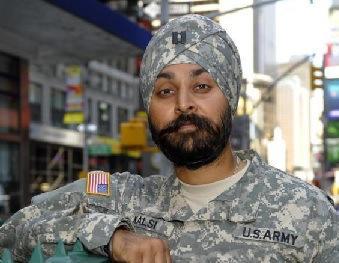
Stars and Stripes: A clean shave and a boot-camp buzz cut are no longer mandatory for adherents of religions whose grooming practices differ from those traditionally required by the U.S. military.
The Pentagon announced Wednesday that beards, turbans, religious body art and other previously off-limits manifestations of spiritual devotion can now be allowed throughout the military. The policy also OKs other religious practices not related to appearance.
In the past, servicemembers occasionally managed to obtain exemptions to policies for religious reasons, but there was no single set of guidelines; the new policy says accommodations will approved unless the military demonstrates a compelling reason to deny the request.
The requests for religious accommodation should “reflect sincerely held beliefs” and not damage military readiness, unit cohesion or good order and discipline, according to a revised Defense Department instruction on accommodation of religious practices.
The policy has its limits, but is designed to allow troops free expression of their religion, as required by Congress in the 2013 National Defense Authorization act, a spokesman said. Jews, Sikhs and Muslims in the military — who together comprise less than 1 percent of the active-duty military, according to a DOD tally based on self-reporting — are among those who in recent years have sought greater latitude to comply with their religions.
“When requests for accommodation are made, the needs of the requesting servicemember are balanced against the needs of mission accomplishment,” Pentagon spokesman Lt. Cmdr. Nathan Christensen wrote in an email. “Only if it is determined that the needs of mission accomplishment outweigh the needs of the servicemember may the request be denied.”
The U.S. Commission on Civil Rights in December sent a letter to Defense Secretary Chuck Hagel about department policies it said “may result in the unnecessary exclusion of Sikh Americans and Americans of other religious faiths from military service based on their religious beliefs manifested in their dress and grooming.”
Requests for accommodation that don’t conflict with standing DOD policies — such as allowing troops to engage in prayers required by their religion throughout the day — can be dealt with by immediate commanders, he said.
Others that butt up against existing policies, such as the wearing of beards or headgear, will need waivers issued by military department secretaries, or by military officers no lower than heads of personnel and manpower for each service.
A group of high-ranking military chaplains and officials from DOD and religious organizations that work with troops will appear Wednesday before the House Armed Services Committee to discuss the Pentagon’s implementation of legislation requiring the military to make religious accommodations for servicemembers.
Reaction to the policy Wednesday was diverse and intense.
Rabbi Sanford Dresin, director of military programs at the Aleph Institute, a Jewish non-profit organization that advocates for military members and prisoners, said he was surprised and cheered by the new policy. The institute recently waged a successful legal battle to win a Jewish chaplain’s right to wear a full beard.
“If this is all true, I’m ecstatic to say the least,” he said. “I think it demonstrates sensitivity and respect for multiculturalism.”
Dresin said he was gearing up to contend with the Marine Corps over the right of Jewish Marines to wear yarmulkes, headwear many Jews feel their religion requires them to wear. He said he now hopes the new policy makes the effort unnecessary.
Dresin, a chaplain endorser for DOD, said it would also make recruiting Jewish chaplains easier. “There remains a shortage of Jewish chaplains in the military and I feel that I will be able to provide additional chaplains if this is the case,” he said.
But Mikey Weinstein, president of the Military Religious Freedom Foundation — which battles what he describes as fundamentalist Christian domination of the military — said the relatively small numbers of non-Christian practitioners who benefit from the new rules would be dwarfed by the number of Christians who use it as cover to try to impose their belief system.

